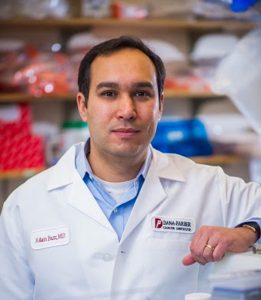New Foundation Grant to Dana-Farber for Study of “Chromosomal Instability” in Gastric Cancer

“We’re building something we think is innovative and important—this grant is making that feasible.”
Gastric tumors with a genetic abnormality called microsatellite instability-high (MSI-H) can be treated with immune-targeted drugs, but there’s a much more common form of disordered DNA in stomach tumors that’s not as well understood. It’s called “chromosomal instability” (CIN), and the Gastric Cancer Foundation has awarded a new one-year grant to researchers who are studying this abnormality in gastric cancer—and looking for potential drug targets related to it.
The Foundation has awarded $75,000 to the lab of Adam Bass, M.D., associate professor of medicine at Harvard Medical School, which will be used to fund early-stage research focused on finding new therapies for CIN-driven gastric tumors.
“One of the things we’re trying to do is gain a better understanding from cancer genome data so we can characterize and categorize chromosomal instability,” Bass says. “Then we can figure out what’s unique about this process in gastric cancer. By building metrics to classify and refine understanding of CIN we will be more able to define novel therapeutics to address it.”
Bass’ research has found that CIN is present in the most common and highly lethal forms of gastric cancer. CIN differs from MSI in a few key ways, he explains. MSI occurs when there are small errors in the DNA copying process, resulting in a high number of mutations that can make tumors more visible to the immune system and therefore amenable to immunotherapy. “Chromosomal instability is a much more chaotic process, where instead of getting small typos when copying the genome, you get enormous structural errors,” Bass says.
To better understand CIN in gastric cancer, Bass’ team is partnering with the Broad Institute of Harvard and the Massachusetts Institute of Technology to evaluate features of CIN that were uncovered in previous studies of patient samples. They are then applying these CIN features to hundreds of cells from cancer that researchers use for laboratory studies. Their goal is to identify specific genetic targets that can be addressed with existing drugs or new medicines that may be most effective in the form of CIN found in gastric cancer.
The GCF funding will allow Bass’ team to establish a computational model, identify promising targets in CIN, and run basic experiments to validate the top prospects. That’s important, because it will give his team the data they need to apply for larger grants to continue the research, which could ultimately inspire the development of new drugs to treat gastric cancer, Bass says.
Bass says the Gastric Cancer Foundation is helping fill a funding gap for basic research in gastric cancer. “Grants from philanthropic foundations are essential for building new research areas,” he says. “A huge problem in the gastric cancer field is that there’s remarkably little of that kind of funding compared to many other cancer types. We’re building something we think is innovative and important—this grant is making that feasible.”
.
